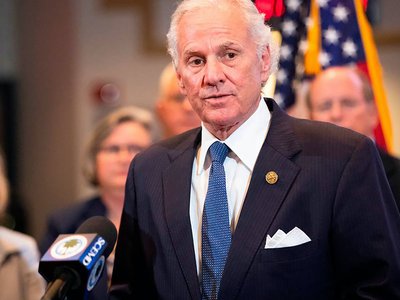Florida Gov. Ron DeSantis on Friday signed into law a controversial bill that critics said will drastically limit race education in schools.
HB 7, formally called the "Individual Freedom" measure, bans educators from teaching certain topics related to race and is designed, in part, to prevent teachers from making students feel guilt or shame about their race because of historical events.
The bill was officially delivered to DeSantis on Friday, and he signed it into law at Mater Academy Charter Middle/High School in Hialeah Gardens.
"We believe in education, not indoctrination, DeSantis said at a news conference. "We believe an important component of freedom in the state of Florida is the freedom from having oppressive ideologies opposed upon you without your consent."
The bill, which was passed by the Florida Legislature in March, bans educators from teaching students that "one race, color, national origin, or sex are morally superior to members of another race, color, national origin, or sex" and that "a person, by virtue of his or her race, color, national origin, or sex is inherently racist, sexist, or oppressive, whether consciously or unconsciously."
"The bill that we'll be signing here today provides substantive protections for both students and parents to ensure that the education they're receiving in Florida is consistent with the standards of the state of Florida," DeSantis said. "And those standards do not allow pernicious ideologies like Critical Race Theory to be taught in our K-12 schools."
Critical Race Theory is the belief that racism is infused in American society, as well as in its institutions and legal systems.
"We are not gonna use your tax dollars to teach our kids to hate this country or to hate each other," DeSantis said.
"This is ridiculous. Forget it being unconstitutional. It's not needed," said State Sen. Shevrin Jones, D-Miami Gardens, before the bill was passed in March. "Children should be able to learn true history. I don't care if it's Black history. I don't care if it's Jewish history."
Another sticking point is a section which prohibits educators from promoting lessons that would make students "feel guilt, anguish, or other forms of psychological distress because of actions, in which the person played no part, committed in the past by other members of the same race, color, national origin, or sex."
Opponents worry the bill is too vague, will chill race education in the state, and open a door to frivolous litigation.
Supporters, however, feel students should not be taught lessons that will make them feel ashamed of their ancestors.
"We all have a stain on our history for the actions of some," said State Sen. Kelli Stargel, R-Lakeland, before the legislation was passed last month. "But I would have a real hard time if my children were to sit in a classroom and be told that they need to feel guilt and shame for what happened. Because I think my children have the ability to stand tall and proud for the behavior of their grandfather."
Stargel added she doesn't think "we should be teaching a certain race should feel that they're better or worse than another, based solely on their skin."
"The message today — and I heard it said multiple times — that we of White privilege are supposed to feel guilt and shame, I don't subscribe to that," Stargel said. "We're gonna teach honest history. But we're not gonna influence it with an opinion one way or the other."
The "Individual Freedom" bill was sponsored by State Sen. Manny Diaz, R-Hialeah Gardens, who has touted the policy as a way to prevent the indoctrination of students and employees.
"We send our students to school to learn. To be thinkers. Not to be told what to think," Diaz said in March.
The Palm Beach County School Board voted in February to send a letter to Florida lawmakers, denouncing HB 7 and saying it "represents censorship."
In the letter, Superintendent Mike Burke and all seven school board members said the legislation "would compromise an educator's ability to teach honest LGBTQ history, Black history, and the historic reasons behind gender and race discrimination."
Once DeSantis signs the measure into law, the curriculum changes will take effect on July 1.
The "Individual Freedom" measure is one of several controversial pieces of education legislation passed by the Florida Legislature this year.
The "Parental Rights In Education" bill — dubbed by critics the "Don't Say Gay" bill — was signed into law by DeSantis on March 28.
The law bans classroom instruction on "sexual orientation or gender identity" in kindergarten through third grade, or "in a manner that is not age appropriate or developmentally appropriate for students in accordance with state standards."
Critics feel the legislation is discriminatory and threatens the acceptance and inclusion of LGBTQ students in Florida schools






